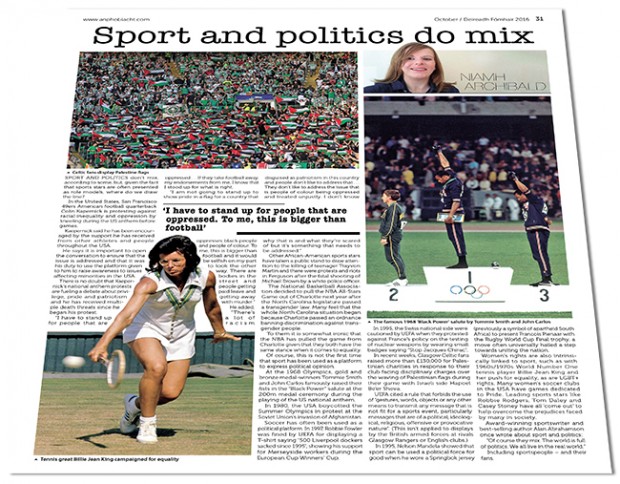3 October 2016 Edition
Sport and politics do mix

‘I have to stand up for people that are oppressed. To me, this is bigger than football’
SPORT AND POLITICS don’t mix, according to some, but, given the fact that sports stars are often presented as role models, where do we draw the line?
In the United States, San Francisco 49ers American football quarterback Colin Kapernick is protesting against racial inequality and oppression by kneeling during the US anthem before games.
Kaepernick said he has been encouraged by the support he has received from other athletes and people throughout the USA.
He says it is important to open the conversation to ensure that the issue is addressed and that it was his duty to use the platform given to him to raise awareness to issues affecting minorities in the USA.
There is no doubt that Kaepernick’s national anthem protests are fueling a debate about privilege, pride and patriotism and he has received multiple death threats since he began his protest.
“I have to stand up for people that are oppressed . . . If they take football away, my endorsements from me, I know that I stood up for what is right.
“I am not going to stand up to show pride in a flag for a country that oppresses black people and people of colour. To me, this is bigger than football and it would be selfish on my part to look the other way. There are bodies in the street and people getting paid leave and getting away with murder.”
He added:
“There’s a lot of racism disguised as patriotism in this country and people don’t like to address that . . . They don’t like to address the issue that is people of colour being oppressed and treated unjustly. I don’t know why that is and what they’re scared of but it’s something that needs to be addressed.”
Other African-American sports stars have taken a public stand to draw attention to the killing of teenager Trayvon Martin and there were protests and riots in Ferguson after the fatal shooting of Michael Brown by a white police officer.
The National Basketball Association decided to pull the NBA All-Stars Game out of Charlotte next year after the North Carolina legislature passed a transgender law. Many feel that the whole North Carolina situation began because Charlotte passed an ordnance banning discrimination against transgender people.
To them it is somewhat ironic that the NBA has pulled the game from Charlotte given that they both have the same stance when it comes to equality.
Of course, this is not the first time that sport has been used as a platform to express political opinion.
At the 1968 Olympics, gold and bronze medal-winners Tommie Smith and John Carlos famously raised their fists in the “Black Power” salute at the 200m medal ceremony during the playing of the US national anthem.
In 1980, the USA boycotted the Summer Olympics in protest at the Soviet Union’s invasion of Afghanistan.
Soccer has often been used as a political platform. In 1997, Robbie Fowler was fined by UEFA for displaying a T-shirt saying “500 Liverpool dockers sacked since 1995”, showing his support for Merseyside workers during the European Cup Winners’ Cup.
In 1995, the Swiss national side were cautioned by UEFA when they protested against France’s policy on the testing of nuclear weapons by wearing small badges saying “Stop Jacques Chirac”.
In recent weeks, Glasgow Celtic fans raised more than £130,000 for Palestinian charities in response to their club facing disciplinary charges over the waving of Palestinian flags during their game with Israeli side Hapoel Be’er Sheva.
UEFA cited a rule that forbids the use of “gestures, words, objects or any other means to transmit any message that is not fit for a sports event, particularly messages that are of a political, ideological, religious, offensive or provocative nature”. (This isn’t applied to displays by the British armed forces at rivals Glasgow Rangers or English clubs.)
In 1995, Nelson Mandela showed that sport can be used a political force for good when he wore a Springbok jersey (previously a symbol of apartheid South Africa) to present Francois Pienaar with the Rugby World Cup Final trophy, a move often universally hailed a step towards uniting the nation.
Women’s rights are also intrinsically linked to sport, such as with 1960s/1970s World Number One tennis player Billie Jean King and her push for equality, as are LGBT+ rights. Many women’s soccer clubs in the USA have games dedicated to Pride. Leading sports stars like Robbie Rodgers, Tom Daley and Casey Stoney have all ‘come out’ to help overcome the prejudices faced by many in society.
Award-winning sportswriter and best-selling author Alan Abrahamson once wrote about sport and politics:
“Of course they mix. The world is full of politics. We all live in the real world.”
Including sportspeople – and their fans.




